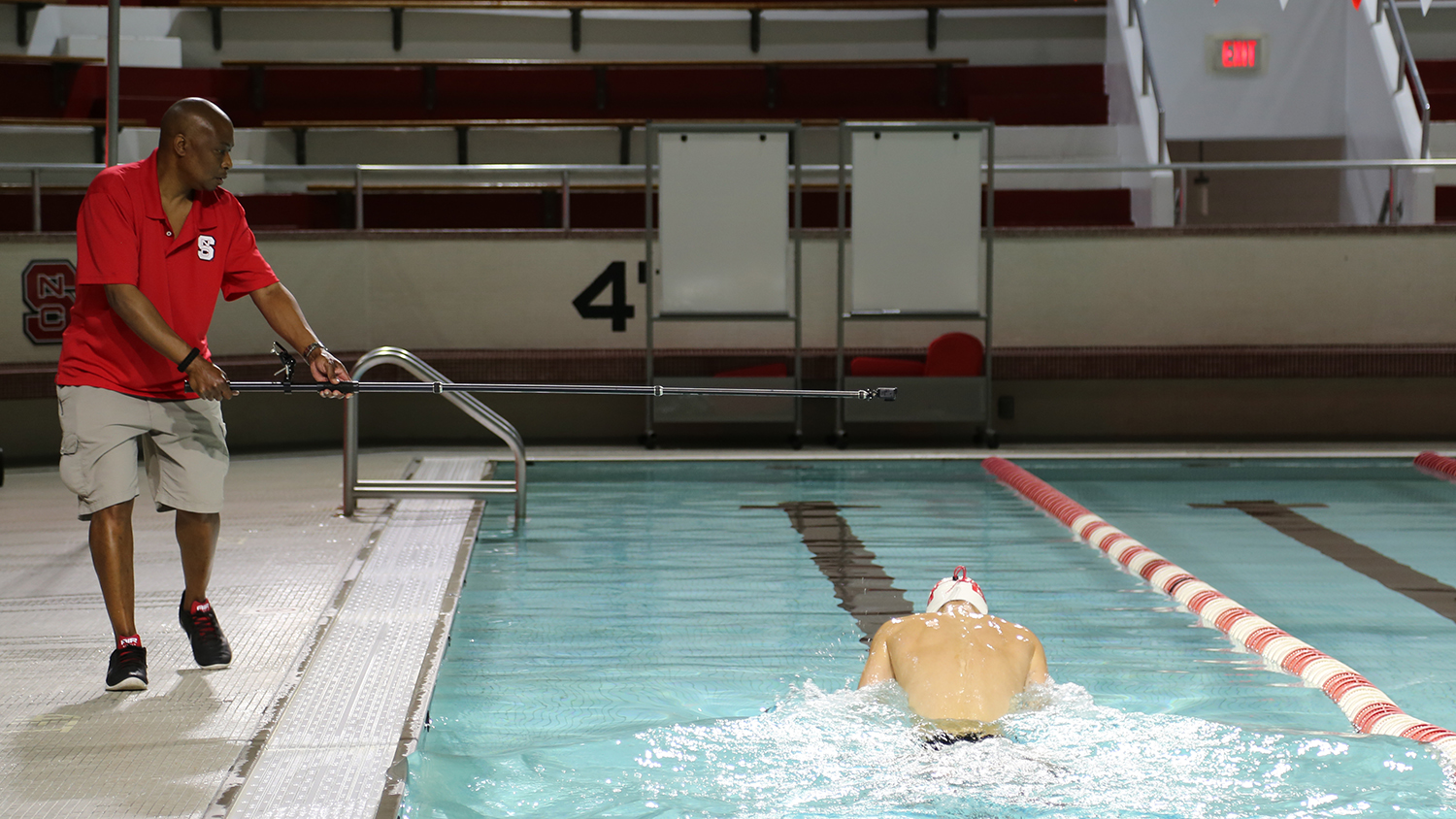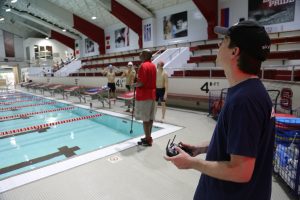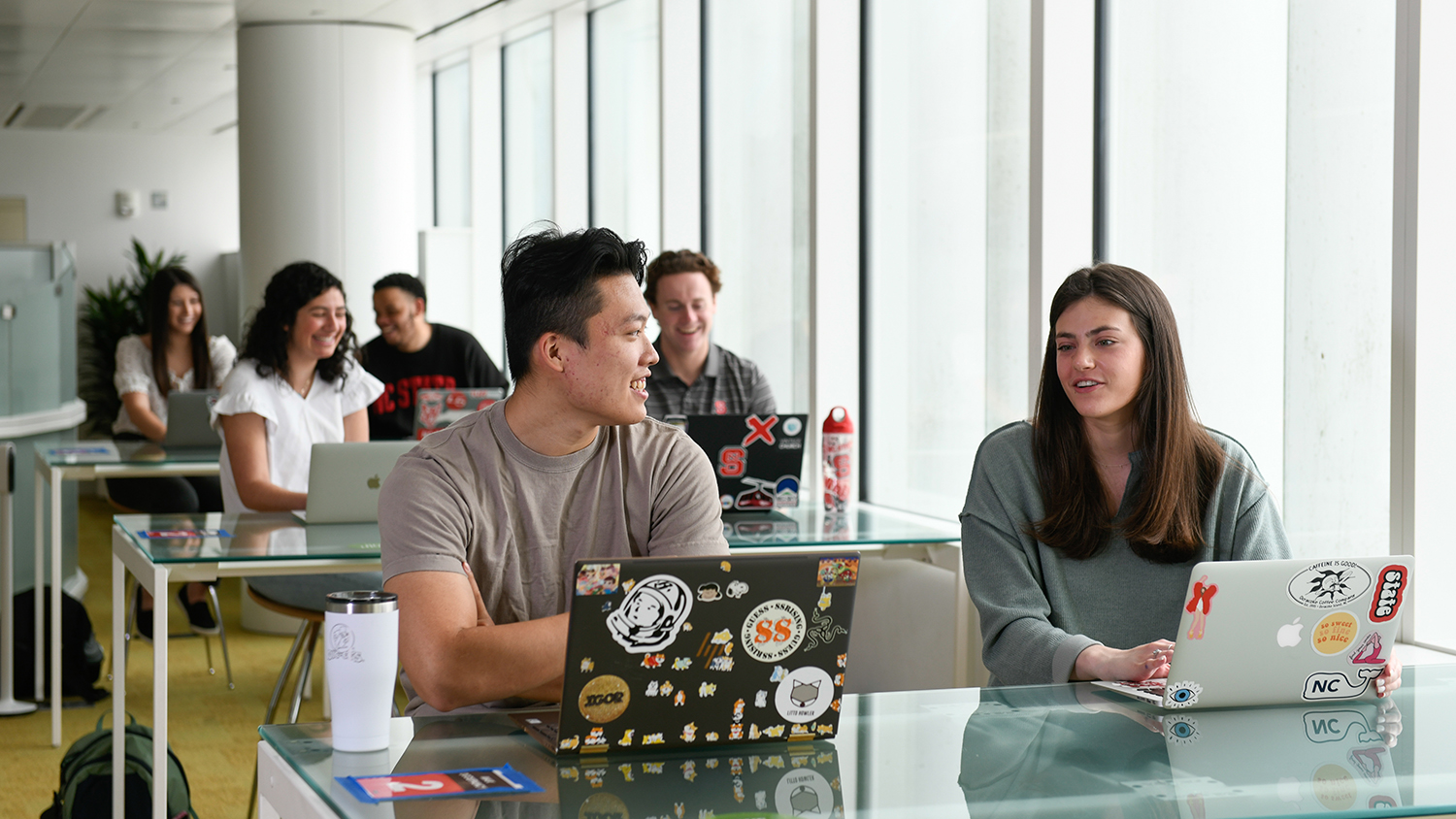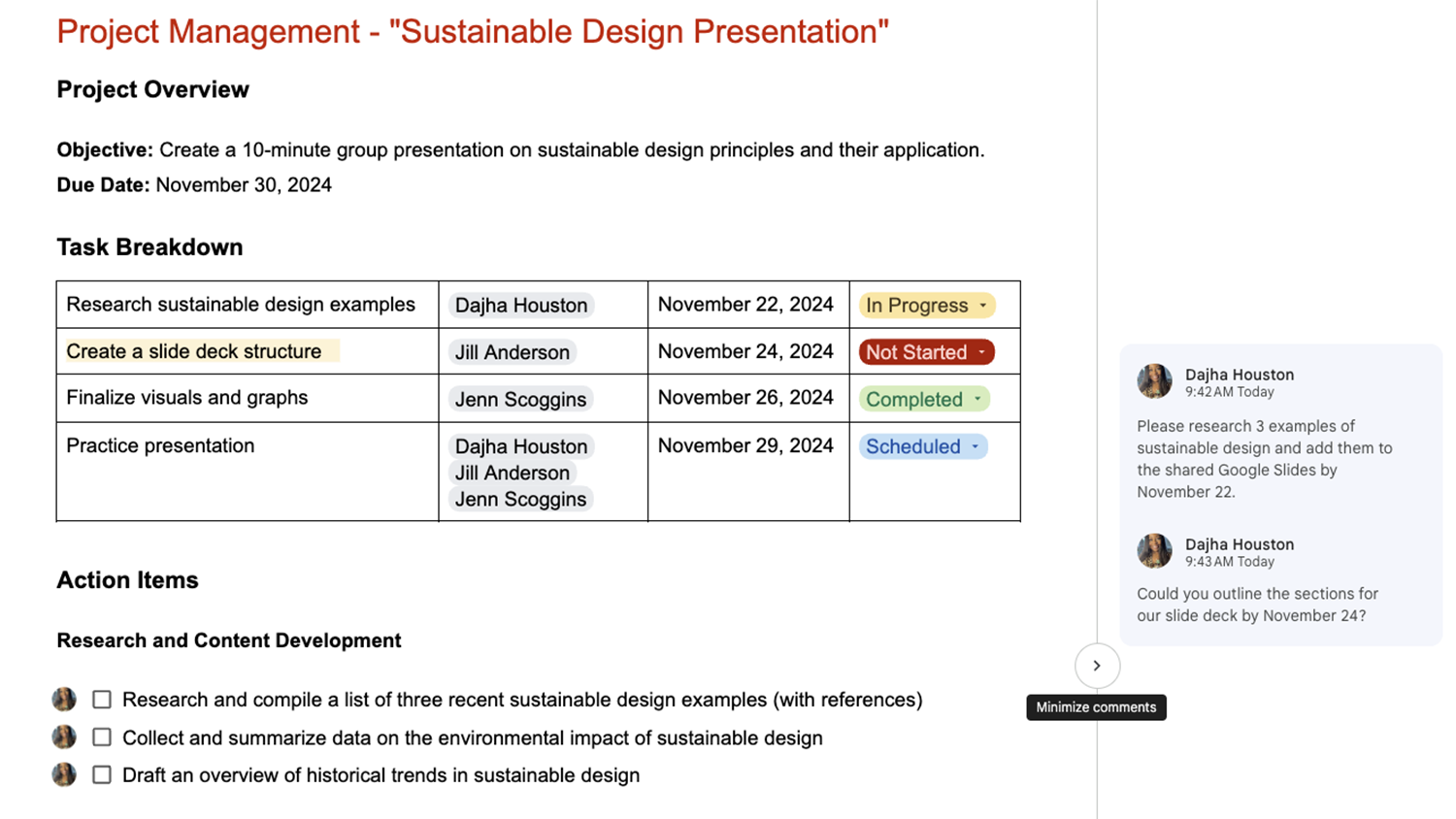Instructional Media Production Delivers All-around Innovation in Fiscal Year 2018-2019

DELTA’s Instructional Media Productions (IMP) team is taking online learning at NC State to places it has never been before — from 10 feet below water to 50 feet above campus.
The team, led by Associate Director of IMP John Gordon, has kept busy in fiscal year (FY) 2018-2019 with a diverse lineup of projects, technologies and initiatives. Associate Producer Todd Buker, Associate Producer Michael Castro, Instructional Media Producer Arthur Earnest, and Mobile Media Producer Jeff Robinson make up the IMP team and are driving innovation at NC State.
On multiple occasions, IMP has served DELTA and NC State’s missions to improve and create opportunities for student success. They’ve also worked to represent the university and its achievements within academic and research communities around the world, even earning NC State two Telly Awards in 2019.
We’re excited to share the outstanding strides the team has made during the past year.
Swim Conditioning Video Production
Thanks to IMP, NC State distance education students in HESF 104: Swim Conditioning can learn the mechanics of swimming for fitness from the comfort of dry land.
To make this possible, the team needed to capture different viewpoints to provide students with a complete understanding of key swimming strokes. They approached this challenge creatively, combining traditional techniques with the waterproof GoPro HERO7 camera and drone technology to capture shots of swimmers from the poolside, underwater and in the air.
Before these shots could come together, a lot of preparation was required. IMP could not begin production without first acquiring a drone license. To start, the team’s drone pilots took an online course to prepare for a written test mandated by the Federal Aviation Administration, composed of questions regarding terms of safety, weather conditions, communications and more. Once completed, they advanced to an additional test for the North Carolina Department of Transportation. Finally, after logging five hours of flight time and registering with NC State, they were ready to fly.
Such careful preparation is critical for shoots like this one, when a variety of factors can impact the execution and outcome.
“We flew inside the Aquatic Center over the pool to get overhead shots of the swimmers’ strokes. We had to fly fairly low and watch out for air vents that would blow the drone off-course!” says Buker.

IMP’s determination leading up to, during and after the shoot yielded powerful results.
“The aerial footage provides unique angles even on-campus students would not normally see. Enabling a learner to observe proper swim technique from overhead and following the swimmer down the lane puts a picture in the learner’s head that they can emulate in the pool,” says Gordon.
The team doesn’t plan to stop employing drone technology any time soon. To do so would be to miss out on the promising and affordable advancements it presents in the classroom, both on campus and online, as instructors and instructional designers become more familiar with its capabilities to engage students.
“Drone footage is a great way to get the learner into places they cannot normally go. Aerial footage reveals landscape, [architecture], scale, juxtaposition and other information that was not possible.” Gordon adds, “We are just beginning to understand all the possibilities for learning that aerial footage provides.”
CRISPR Video Production
IMP not only supports the creation of high-quality instructional materials for NC State; they also make sure that our faculty are well-represented on campus –– to their peers and within larger academic communities.
This is exactly what they did for Chase Beisel, assistant professor in the Department of Chemical and Biomolecular Engineering, and his groundbreaking work with CRISPR. The Beisel Lab seeks to understand and manipulate the CRISPR-Cas system in bacteria, a biological technology with promising implications for gene editing and regulation.
In 2018, Beisel earned the Camille Dreyfus Teacher-Scholar Award, a program that recognizes and funds the exceptional work of young faculty in the chemical sciences. IMP helped him create a video for the Camille and Henry Dreyfus Foundation website to not only showcase his accomplishments, but to highlight the advancements being made at NC State.
“The video DELTA produced improved how NC State University and the labs were represented on this prestigious website,” says Gordon. “Dr. Beisel also now has an important tool to use as he travels the world attending conferences and meetings, all to help explain to potential donors and partners the work being conducted.”
Supporting Campus Partners
As part of its role at DELTA, IMP often extends their service around campus to support various initiatives for NC State, with an extensive portfolio to show for it.
“IMP has worked with many campus partners to enhance learning and research at NC State University. In addition to creating 95 videos in support of NC State University learning, IMP consulted and partnered in many ways,” says Gordon.
This past year, they’ve supported numerous campus partners:
- Department of Applied Ecology: Collaborated with Aquatic Sciences Ph.D. students to improve microscope video capture, resulting in the lab’s new microscope camera. They also reviewed the capture of feeding habits among sea bass to develop fish foods.
- Wilson College of Textiles: Discussed techniques with faculty to record brief and concise lessons at a low cost.
- Testing Services: Produced videos to teach users about the Test Centers and answer popular questions about the facility.
- NC State University, UNC Charlotte, UNC-TV: Held an inaugural summit at DELTA’s main campus production studio to connect over technologies, resources and production techniques and best practices in November 2018.
- Division of Academic and Student Affairs: Worked together to improve media information at E. Carroll Joyner Visitor Center. IMP also facilitated the use of faculty profile videos on the Enrollment Management and Services website.
Employing New Technologies
With each passing year comes new advancements in the field of media production, and it’s important that our instructional media producers stay up-to-date.
In FY 2018-2019, IMP implemented a myriad of new technologies in their projects:
- Ambisonic audio technology. Enhances the VR/AR experience with 360° audio that is synchronized to the 360° images a user will see. The audio is adaptive to the images presented and the perspective of the user. “[It’s] taking 360° VR/AR technology to the next level,” says Gordon.
- Wireless video technology. Allows a producer or director to monitor and interact with a photographer as they create fast-moving shots. With this system, a director can be sure they capture precise shots and clarify key concepts for students.
- Three-axis stabilized handheld cameras (gimbal cameras). Makes shooting faster, easier, more refined and cost-efficient. IMP is testing several different models for their purposes, including the GoPro HERO7, Osmo Pocket camera, and the Zhiyun Handheld Gimbal.
- Sound Devices MixPre-6. Improves audio quality and expands IMP’s flexibility within complex sound conditions. This audio mixer works both in the field and in the studio, allowing the team to produce quality results faster.
- Countryman mini-microphones. Delivers high-quality audio recordings free of distracting feedback. IMP is experimenting with these microphones which can be concealed thanks to their small size.
Each of these tools is brought to DELTA after plenty of research. Keeping up with the latest releases and updates can be overwhelming, but the IMP team has honed in on useful outlets to make sure they’re ahead of the curve.
“We watch a lot of product release videos and YouTube reviews on new gear as well as go to conferences like National Association of Broadcasters (NAB) Show, which is one of the biggest conferences for video production in the world,” says Gordon.
Members of the team frequent Lynda.com (now LinkedIn Learning) for instructional videos, and they also benefit from hands-on training in the form of workshops. They’ve attended classes at Maine Media Workshops. The program was so effective, the team brought an instructor to teach in person at NC State.
One of the best ways to become familiar with a technology is simply to test it out. IMP may obtain loaner equipment from manufacturers before making a purchase. Sometimes, manufacturers will make a trip to campus to demonstrate the tools.
“We do a lot of testing, especially with new products. We’re constantly working to improve our workflows and output,” says Buker. “There are constant challenges, especially when you shoot in the field. Through experience and testing, we’re usually able to improvise solutions on the spot when we shoot.”
IMP has also welcomed a large development in FY 2018-2019 –– a completely redesigned studio, built to help them serve NC State with the latest tools and technology.
“IMP redesigned our space in Park Shops this year. The improvements to the studio, equipment room and editing suites have sped up the way equipment is readied for field shoots and has given producers more and improved options for shooting in our small studio,” says Gordon.
Innovation in Process, Technology and Design
When asked to summarize his team’s experience in FY 2018-2019, Gordon emphasized their tireless dedication to the materials they capture and the people who will use them, declaring an overarching theme of “innovation in process, technology and instructional media production design.”
“IMP pushed itself in 2018-2019 to improve the quality of instructional media while constantly looking for and finding ways to improve efficiency,” Gordon adds.
As we transition into a new fiscal year, the projects IMP launched in 2018-2019 will remain instrumental to NC State’s success. Additionally, the team has laid the foundation for successful years to come by welcoming and inspiring new talent.
In response to a high demand for instructional media, IMP added a part-time video shooter and editor to the team in FY 2018-2019. They also welcomed three student interns, two in summer 2018 and one in summer 2019, as part of their internship program which began last year.
“IMP is continuing the program this year and has added a pay component for the student. This year’s student is editing materials for a College of Natural Resources course that will be used in a new app to role out fall 2019. We are hoping these students will continue in their career and remain partners with NC State and DELTA,” says Gordon.
In FY 2019-2020, keep an eye out for the exciting results of IMP’s work this past year, and stay tuned for what they have in store.


